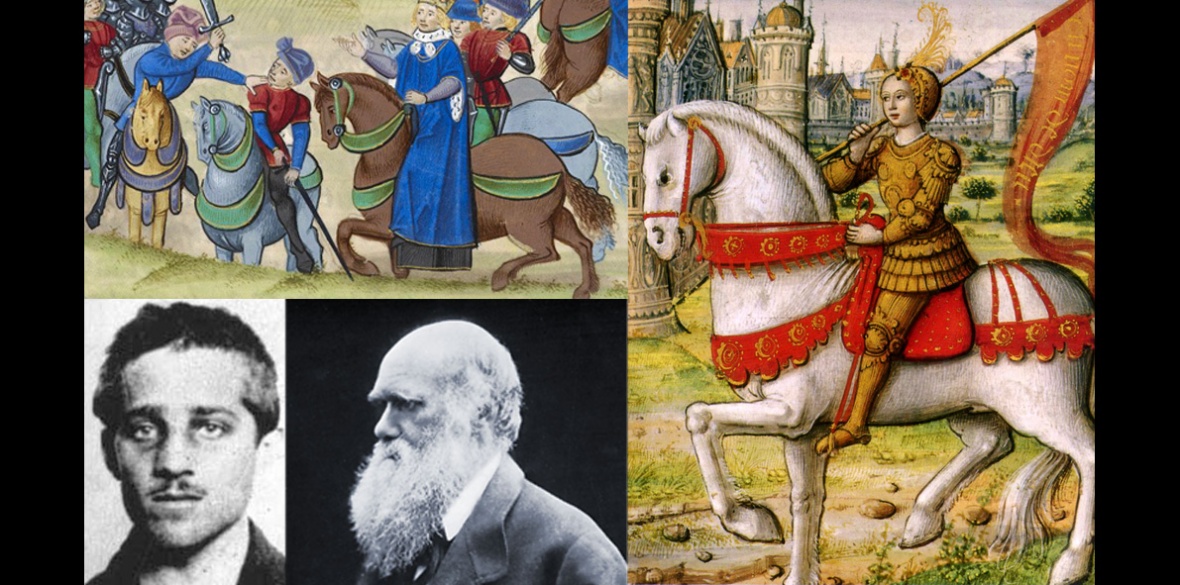This is the last article you can read this month
You can read more article this month
You can read more articles this month
Sorry your limit is up for this month
Reset on:
Please help support the Morning Star by subscribing here
IF YOU’RE an older person it’s likely that the history you had at school was primarily a list of dates of kings, queens and (old) prime ministers.
If you’re young it’s likely that you’ll have learnt more about “movements” — the American civil war, maybe about the civil-rights movement (but probably very little about the Peasant’s Revolt, the Putney Debates, Chartism or the miners’ strike, and probably next to nothing about class struggles in Europe).
Either way, it is likely that the names of individuals figure prominently. Hitler “started” the second world war: the assassination of Archduke Ferdinand (in Sarajevo by Gavrilo Princip, a lesser-known figure, but something of a hero to Yugoslavs) began the first world war.
We talk about the Victorian era, Napoleonic France, Darwnism, Thatcherism — and, of course, Marxism!
For Marxists, history tries to look beyond the individuals to examine the reasons why people, including those who you’ll never have heard of and those whose names never figured in any written records, acted as they did.
Not just individual circumstances and motivations, but why people acted together, collectively.
It’s about how people get their living, how they see the world and what they do to change it and why, particularly as members of a wider group — their class.
No one individual, no matter how talented, capable, evil or farsighted, can determine the main course of historical development.
That doesn’t mean that individuals aren’t important — they are. And in certain circumstances, the role played by individuals can be decisive.
Without Wat Tyler, Joan of Arc, Henry VIII, Cromwell, Napoleon, Hitler, Mussolini, Stalin, Mao, Kennedy, Gorbachev, Thatcher, Blair (add Trump and Johnson and Corbyn) the history of the periods in which they lived would be incomplete, to say the least.
One “guessing game” in relation to the role of individuals in history is: why did they do what they did?
Another (not favoured by serious historians) is the “counterfactual”; what would have happened — and what would the world be like today — if they had acted differently?
One of the most influential Marxist texts was Georgi Plekhanov’s The Role of the Individual in History.
This was written as an attack on the “great man” theory of history — popularised by the writer Thomas Carlyle — and in particular as a polemic against the Russian Narodniks who emphasised the role of direct action and the revolutionary hero (possibly armed with a bomb) in transforming tsarism.
Plekhanov argued that history should be seen neither as the consequence of the actions of individuals “from above” nor of movements “from below.”
The relationship is a dialectical one, and teasing out these links is one of the attractions of history as a subject, and vital if we are going to try not just to interpret the world, but to change it.
Plekhanov’s thesis had a number of elements. One was pretty abstract — the relationship of “free will” to fatalism.
He argued that historical change could no longer be regarded as the consequence of some innate human nature, or as the manifestation of divine will.
The “development of the productive forces” was the most general basis for historical change, as these were closely connected to changes in society.
But there are also what he called “particular causes” — specific, contingent factors to do with the existing situation at any given time and place.
Finally, he said: “The influence of the particular causes is supplemented by the operation of individual causes […] and other ‘accidents’ thanks to which events finally assume their individual features.
“Individual causes cannot bring about fundamental changes in the operation of general and particular causes […] Nevertheless, there is no doubt that history would have had different features had the individual causes which had influenced it been replaced by other causes of the same order.”
Marxists maintain that while individuals cannot change the objective course of history at will, nevertheless the individual can at times play a major role.
As Lenin declared: “The idea of historical necessity does not in the least undermine the role of the individual in history: all history is made up of the actions of individuals.”
Perhaps closest to the Marxist view is that individuals come forward to play a significant part in events when the need or opportunity arises: “Cometh the time…” But that too is a dialectical process — in acting to change things, the individual also changes.
As Marx said in Capital, socialism and the struggle to achieve it is a major element in what he called “the self-realisation of the person” and the transitions from individuals into “fully developed human beings.”
All this applies to negative as well as progressive changes. Without Stalin, Soviet history — and indeed the history of the world communist movement up to the end of the second world war and after it — could have taken a very different course.
But as in nazi Germany, the “cult of the individual” even here obscures the objective circumstances which allowed one person to exercise such a dominant influence — in the former case the necessity for the young socialist state to defend itself from attacks from outside and within (many of these latter imagined) and in the case of nazi Germany, the chaos of the Weimar republic and the rise of fascism as the “solution” to a more general crisis of capitalism.
The argument does not just apply to political figures, but also to science and culture.
Science (for example) is often conceived as “pure” knowledge or “facts,” independent of the way these are produced, controlled or used.
Marxists would challenge this, pointing out that throughout history, the changing content of scientific knowledge — what are understood at any point in time as facts — are closely related to the social conditions of their production, though in a dialectical rather than a deterministic way.
Marx, writing to Engels about Darwin’s theory of evolution by natural selection commented: “It is remarkable how among beasts and plants Darwin recognises his English society with its division of labour, competition, opening up of new markets, ‘inventions’ and Malthusian ‘struggle for existence’.”
Darwin himself was only prompted to “go public” when he discovered that Alfred Wallace, working in the Malay Archipelago, had been thinking — and writing — along very similar lines.
In 1931 a Soviet delegation arrived unannounced at the second International Congress of the History of Science in London, where its leader, Boris Hessen delivered a paper entitled The Socio-Economic Roots of Newton’s Principia.
Hessen argued that Isaac Newton’s Principia — perhaps the single most important scientific treatise of Western civilization — was intimately connected to the social conditions of its production.
Newton’s laws of motion and his “discovery” of gravity were not a gift of divine providence, not (just) the product of individual genius (or the consequence of being hit by a falling apple).
They were a response to specific technical problems of early capitalism, in particular the need for improved maritime navigation, the development of new machinery and ballistic weaponry in warfare.
In neither case does the fact that scientific theories are related to the social context of their production mean that they are “wrong” or lacking in objectivity.
But it challenges the conventional view of scientists (and science) as autonomous, having an impact “on” society but not being influenced by society.
Marxism itself, of course, is a product of its time. Lenin said of the works of Marx and Engels that they were “the legitimate successor to the best that humanity produced in the 19th century, as represented by German philosophy, English political economy and French socialism.”
Those three streams had their own basis in the actions of individuals and of the social context in which they acted.
The achievement of Marx and Engels was to build on them and link them to a world view which provided part of the social and political context within which later revolutionaries played their part in the development of theory and practice — both interpreting and changing society.
So, let’s end with Marxism itself. The attribution of individual names to historical periods or scientific theories is itself (as Plekhanov suggested) the result of historical circumstances.
Marx was undoubtedly a towering figure, but so were a host of others. If it hadn’t been Marx who started the ball rolling (incidentally, neither Marx nor Engels liked the term Marxism) it would almost certainly have been someone else — though our understanding of human history and society might have taken longer to develop and might have developed in a somewhat different way.
This answer was collectively edited by participants in the Introduction to Marxism series at the Marx Memorial Library and Workers’ School. Details of this and other courses can be found at www.marx-memorial-library.org.uk.









